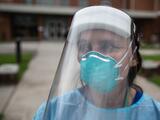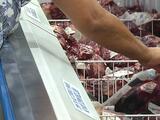What went wrong at the South Dakota meat packing plant where hundreds of immigrant workers were infected?
Lily Ordaz worked at the Smithfield Foods pork plant in Sioux Falls for 13 years before abruptly resigning last month.
It wasn’t an easy as her job paid well, but she has no regrets after the plant, with a large immigrant work force, was forced to close after it was swept this month by a massive wave of covid-19 cases.
“I think it’s the best decision I ever made because I want to protect my family – and myself,” said the 30-year-old Mexican-born mother of a young daughter.
After the first case was leaked to the local media on March 26, the owners tried to keep the plant open despite the mounting concern of workers and the unions.
The South Dakota plant is now linked to more than 900 coronavirus cases, one of the nation’s largest coronavirus hotspots.
US food supply impacted
The Smithfield outbreak is now being replicated in other meat packing firms around the country where companies are struggling to adapt their production lines to add safety measures such as social distancing. At least ten states are now reporting meat packing plant closings, potentially disrupting the nation's food supply.
Of the Smithfield plant’s 3,700-strong workforce, 761 workers have tested positive for covid-19, while 143 people with close contact with those workers have also contracted the disease, according to health officials. Two workers have died due to the coronavirus.
“We anticipate there will be more,” said Kooper Caraway, the president of the Sioux Falls AFL-CIO, the union federation that represents 90 percent of the Smithfield workers. Caraway told Univision that the majority of the Smithfield workers were immigrants from Latin America, Asia and Africa.
“We are going to continue to have a spread (of the virus) because the state has no stay at home order and the governor has not committed to state testing and everybody is going about their daily business,” he added.
Concern was growing that other meat packing businesses in the area are also now reporting outbreaks of the disease, as well as a sprawling elderly persons community in Sioux Falls.
No stay-at-home order
" Now we're just seeing community spread in all the other areas and other businesses and other organizations," Sioux Falls Mayor, Paul TenHaken, told reporters. Even so, his city council rejected imposing a stay at home order, saying it wasn’t necessary. Instead, TenHaken announced the creation of an organization to help local large employers screen their workers and make workplace changes to curb the spread of the virus.
Republican-controlled South Dakota is one of the only states in the country not to impose stay at home rules to stop the spread of the virus.
Rural and agricultural, South Dakota is one of the least populated in the country, with only 885,000 residents. It has so far reported a total of 1,858 confirmed cases of covid-19, with nine deaths, most in Sioux Falls, the state’s largest city with just under 200,000 residents.
After workers like Ordaz quit their jobs and others began to speak out about the lack of safe working conditions as the coronavirus spread through the plant, it was eventually forced to close April 15.
No masks
Ordaz complained that while the company provided gloves and hand sanitizer and checked temperature of workers, there were no masks for workers and a lack of social distancing. “All the people work in lines, shoulder to shoulder,” she said. “There is too much coming and going between breaks,” to prevent close contact between workers.
Local realtor, Nancy Reynoza, who runs the non-profit media website, ‘ Que Pasa Sioux Falls,’ said she began to receive phone calls from concerned workers at Smithfield. “They said they were afraid and they wouldn’t speak up for fear of loing their jobs,” Reynosa, who is the daughter of Mexican immigrants, told Univision.
Reynosa said the company was totally unprepared to handle the virus. “There was no preparation by anyone. Many were afraid because they had no protective clothing. They gave them hair nets ... that's no use as a face mask,” she said.
Matt Hildreth, a state social activist, said the covid-19 outbreak was the result of a long history of exploiting workers by companies that place more emphasis on profits than health security.
"We built this system on exploitation and now it's falling apart," he said. "People go to work sick, in some cases they are paid to work sick and that exploitation is hurting the entire food system," added Hildreth, director of the Rural Organizing group.
"Good food. Responsibly"
The company has not accepted any responsibility for the virus outbreak and says it takes the biosecurity of its plants very seriously. "We remain committed to our employees during this time," Smithfield Foods President Ken Sullivan said in a video that was posted on YouTube. "We have instituted a series of rigorous and detailed processes and protocols that follow strict CDC guidelines to effectively manage potential cases of covid-19 in our operations," he added.
Smithfield's motto is "Good Food. Responsibly".
South Dakota’s Republican Governor, Kristi Noem, added insult to injury when she suggested that the spread of infections was not the result of poor workplace protection but rather due to the workers who brought it into the plant from their homes. “These folk live in the same community, the same buildings, sometimes in the same apartments,” she told Fox News.
Immigrants and refugees
Local activists say Sioux Falls is a very diverse community that in the past 20 years has opened its arms to immigrants from everywhere, and in particular to the federal refugee program.
"We have worked very proactively to build bridges between immigrants and local institutions, such as law enforcement and first responders," said Cristy Nicolaisen, director of the Sioux Falls Multicultural Center, which serves the immigrant community with activities for children and food packages delivered to the homes of families affected by the virus, as well as masks and cleaning supplies.
" There are always some racist comments, but we have worked hard to calm people down and to work together to help the sick," she added. That includes printing useful information about the covid-19 and a short video translated into 11 languages, with the help of local media.
That also implies a degree of cultural sensitivity. " There are refugees here who have survived war. They are used to trying to do the best they can, which generally means not staying home," Nicolaisen said. "We are trying to get the message across that 'we want you to stay home,'" he added.
Many young immigrant families find themselves trying to balance work with the safety of their families. "It is a very difficult situation," said Jordan Bruxvoort, director of the Naomi Project, a Sioux Falls immigrant and worker rights organization.
He described the case of a young married couple from El Salvador. The husband is in hospital with covid-19 and his wife, who works at the Smithfield plant, is also recovering from the virus at home while she cares for her two children. "She is taking a lot of precautions. We talk a lot on the phone and on Facebook," Bruxvoort said.
Preparing to reopen
The Smithfield plant is now preparing to reopen after implementing federal safety recommendations by the Centers for Disease Control (CDC), though no date has been announced. Caraway said the plant would only reopen after the safety measures were negotiated with unions representatives at the plant.
Smithfield Foods is a U.S. company that employs more than 40,000 people, but was bought in 2013 by a large Chinese meat processing conglomerate, WH Group. It’s meat packing operations are considered by the federal government as essential for the nation’s food supply as it is responsible for about 5% of national pork production, purchasing thousands of hogs from local pork farmers.
A healthy workforce
“People need food. It is a necessity. But, in order to produce food, we need a healthy workforce,” the company said in a statement to Univision. “ We are doing everything in our power to help protect our team members from covid-19 in the workplace,” it added.
That included adding hand sanitizing stations, boosting personal protective equipment, including masks, increased social distancing and the installation of plexiglass and other physical barriers on the production floor. However, finding enough masks for Smithfield’s 40,000 employees is no easy task given the high global demand, requiring hundreds of thousands of masks a week.
Due to its essential role in the economy, workers and their unions support a return to work as soon as it is safe.
“We are hoping to make sure that the workers are not returning to the same plant that they left and that they will be entering a much healthier environment,” said Caraway, adding that it was in everyone’s interest, including the company, the ensure a safe return to work.
Were there to be another outbreak of the disease at the plant, it would be forced to shut down again for at least another 14 days, he pointed out.
The company agrees. “We have absolutely no motivation – in fact, we are disincentivized – to have sick team members,” the company said in its statement to Univision.

